

Food items may become expensive. The prices of items used by FMCG companies such as palm oil, coffee, and cocoa have increased. FMCG companies will increase the price of their products to compensate for the increased cost and decreasing margin. This may increase your household budget. Hindustan Unilever (HUL), Godrej Consumer Products Limited (GCPL), Marico, ITC, and Tata Consumer Products Limited (TCPL) have expressed concern over the decrease in urban consumption. According to experts, urban consumption accounts for 65-68 percent of the total sales of the FMCG sector. GCPL Managing Director and Chief Executive Officer (CEO) Sudhir Sitapati said on the occasion of the announcement of the second quarter results, we think this is a short-term setback and we will fix the margin by prudent price increase and stabilizing costs. GCPL, which sells products such as Cinthol, Godrej Number-One, and Hit, has posted a stable quarterly performance despite fluctuations in oil prices and subdued consumer demand in India.
Importantly, rural markets, which were lagging earlier, have maintained their growth pace compared to urban markets. Another FMCG company Dabur India also said that the demand environment was challenging in the September quarter, which included ‘high food inflation and subdued urban demand’. The company, which makes Dabur Chyawanprash, Pudin Hara, and Real Juice, reported a 17.65 percent decline in consolidated net profit during the quarter to Rs 417.52 crore. During this period, the company’s operating income fell by 5.46 percent to Rs 3,028.59 crore.
Nestle will also increase the price of its products.
Recently, Nestle India Chairman and Managing Director Suresh Narayanan also expressed concern over the decline in the FMCG sector and said that the ‘middle segment’ is under pressure as high food inflation has hit household budgets. Regarding the rise in food inflation, Narayanan said that there has been a ‘sharp jump’ in the prices of fruits and vegetables and oil. He said, if it becomes difficult for companies to manage the cost of raw materials, it may lead to a rise in prices. As far as coffee and cocoa prices are concerned, we are facing a difficult situation. Nestle India owns brands like Maggi, Kit Kat and Nescafe. The company’s sales growth has been a marginal 1.2 percent. Another FMCG company ITC has reported a decline of 0.35 percent in margins due to an increase in costs. The company owns brands like Aashirvaad, Sunfeast, Bingo, and Yippee.
Companies suffer losses due to food inflation.
Sunil D’Souza, Managing Director and Chief Executive Officer (CEO) of Tata Consumer Products Ltd. (TCPL), also said that consumer spending in urban areas has been affected. On the occasion of the announcement of the company’s results for the September quarter, D’Souza said, I believe that food inflation is probably more than we think and its impact is much more. HUL CEO and Managing Director Rohit Java said that the market volume growth has been sluggish in this quarter. Java said the situation is quite clear that urban growth has been affected in recent quarters or quarters. Slow growth continues in the rural sector and now for the last few quarters it is ahead of the urban area and this time too it is ahead of the urban area. HUL owns brands like Surf, Rin, Lux, Ponds, Lifebuoy, Lakme, Brooke Bond, Lipton, and Horlicks. HUL’s consolidated net profit declined by 2.33 percent in the September quarter. Similarly, Marico has also witnessed twice the growth in demand in rural areas as compared to urban areas on a year-on-year basis.
Read More: The Life Insurance for Your Stocks Breaking Down LIC’s Strategic Move into Cipla

 Share
Share



